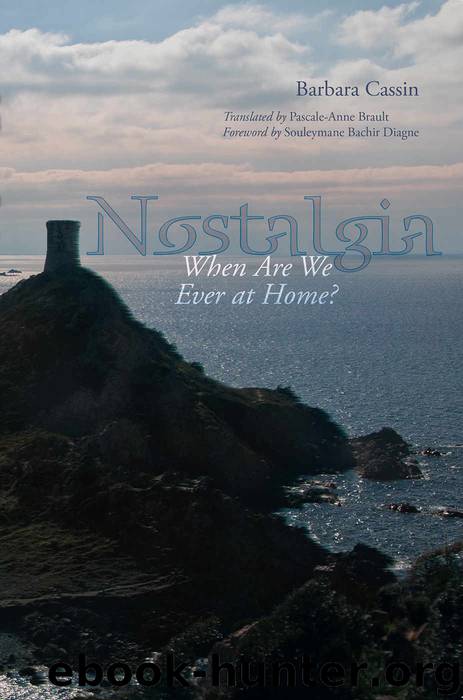Nostalgia: When Are We Ever at Home? by Barbara Cassin

Author:Barbara Cassin [Cassin, Barbara]
Language: eng
Format: azw3
Publisher: Fordham University Press
Published: 2016-03-01T05:00:00+00:00
Arendt: To Have One’s Language for a Homeland
The Europe of the pre-Hitler period? I can’t say that I don’t have any nostalgia for it. What remains? The language remains.
—HANNAH ARENDT1
The Language and the People
ASSIGNING IDENTITY: A POLITICAL PREDICATE AND NOT AN ESSENCE
Aeneas will no longer speak Greek but Latin. The sign of exile is the transformation in one’s relation to language: exile denaturalizes the mother tongue. Aeneas no longer speaks the logos, like Odysseus, but one language among others. And when one settles down in another “homeland,” one becomes “naturalized.” Hannah Arendt lived and thematized this relation to language, to culture, and to the homeland of her childhood with the greatest lucidity in a number of texts, letters, and interviews, during her long exile, beginning with her flight from Germany in 1933, her stay in France as a refugee, her arrival, by way of Lisbon, in the United States in May 1941 with the status of stateless person, and her eventual “naturalization” as an American citizen some ten years later, in 1951. Günter Gaus, in an interview for German television that was shown in 1964, asks her if she misses pre-Hitlerian Germany, the space-time of her birth. She responds: “The Europe of the pre-Hitler period? I can’t say that I don’t have any nostalgia for it. What remains? The language remains” (“LR” 12).
It is the mother tongue, not the land of her fathers, that constitutes her homeland: instead of agreeing to Latin in order to found Rome, it is the resistance of German in New York that makes the homeland. By the same token, Arendt teaches us how to detach language from people even more radically. The German language and the German people are not identical or superimposable in any way, especially not politically. It is another conception of the homeland that comes to light after the horrors of the war, one that is more Roman than Greek, or, according to a contemporary philosophical classification, more Arendtian than Heideggerian, and, without any doubt, politically relevant today.
The difference between the mother tongue and the land of the fathers is linked to the extreme caution that must accompany any assignation of identity and, above all, that of “Jewish” identity. We know from Odysseus that every odyssey amounts to putting into narrative form the assignation of identity. Arendt used to say that she did not know she was Jewish when she was a little girl. “I first met up with it through anti-Semitic remarks—they are not worth repeating—from children on the street” (“LR” 6). Indeed, I believe, from personal experience, that being Jewish, like being a woman, requires at the very least that you be told this, that it be made known to you. It is not a direct identity but a mirroring relation, a differential assignation. Arendt’s level-headedness, which she gets from her mother, a Jewish mother obviously but also a socialist mother faithful to Rosa Luxemburg, can be summed up in a single sentence that becomes a kind of watchword for her: “if one is attacked as a Jew, one must defend oneself as a Jew” (“LR” 12).
Download
This site does not store any files on its server. We only index and link to content provided by other sites. Please contact the content providers to delete copyright contents if any and email us, we'll remove relevant links or contents immediately.
| Books & Reading | Comparative Literature |
| Criticism & Theory | Genres & Styles |
| Movements & Periods | Reference |
| Regional & Cultural | Women Authors |
4 3 2 1: A Novel by Paul Auster(12393)
The handmaid's tale by Margaret Atwood(7767)
Giovanni's Room by James Baldwin(7347)
Asking the Right Questions: A Guide to Critical Thinking by M. Neil Browne & Stuart M. Keeley(5775)
Big Magic: Creative Living Beyond Fear by Elizabeth Gilbert(5774)
Ego Is the Enemy by Ryan Holiday(5450)
The Body: A Guide for Occupants by Bill Bryson(5098)
On Writing A Memoir of the Craft by Stephen King(4944)
Ken Follett - World without end by Ken Follett(4734)
Adulting by Kelly Williams Brown(4574)
Bluets by Maggie Nelson(4559)
Eat That Frog! by Brian Tracy(4541)
Guilty Pleasures by Laurell K Hamilton(4450)
The Poetry of Pablo Neruda by Pablo Neruda(4110)
Alive: The Story of the Andes Survivors by Piers Paul Read(4033)
White Noise - A Novel by Don DeLillo(4012)
Fingerprints of the Gods by Graham Hancock(4005)
The Book of Joy by Dalai Lama(3986)
The Bookshop by Penelope Fitzgerald(3854)
